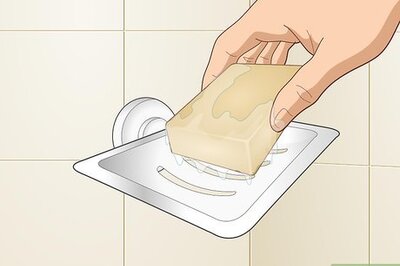
views
- Stay cordial and be polite with your daughter-in-law as much as you can.
- Set firm boundaries with her, and don’t let her (or your child) cross them.
- Avoid talking badly about her to your grandchildren or your child.
Respect your child's choice.

Stay neutral to avoid pushing your child away. Your child loves this woman, no matter that you can't understand what they see in her. No matter what your true feelings are, never say a word against her to your child. There’s a difference between bad-mouthing her and giving constructive criticism or asserting your boundaries. Try to avoid being rude or negative, and instead offer up ways you can all reconnect.
Stay cordial at all times.

Be polite and respectful so you don’t come off as rude. No matter what your daughter-in-law is doing, stay calm, cool, poised, and polite. Treat her like a stranger or an acquaintance if you have to—someone you’re not particularly close to, but someone you don’t mind saying hello to. The only real exception to this is if you have little kids around and she's cursing like crazy. Then you might say, mildly, "Ooh—can we watch the language while the kids are here? They get into trouble for saying that word and I don't want them to pick it up here. Thanks." Sometimes, daughter-in-laws will be rude because they feel threatened or like they have to fight for their spouse’s attention.
Set your boundaries to stay comfortable.

Establish clear boundaries that your daughter in law can’t cross. Perhaps you don't wish to support this union any more than is absolutely necessary to maintain some relationship with your son. Tell your daughter-in-law what you will and won’t do early-on so she knows what your boundaries are. If your daughter-in-law makes snide or nasty remarks about another family member, say, "Well, she may not have much fashion sense, but she is one of the sweetest people I know, and I love her very much." This lets her know, in a calm, non-critical way, that you will not be interested in hearing her snipe at this person. If she drops over unannounced, don't lie but stop her at the door with a regretful but firm, "I'm sorry, Allison, I'm just about to go and run my errands, so I need to fly.”
Remember that she may be the mother of your grandchildren.

Stay cordial with her so you can see your grandchildren in the future. Your best bet to retain visitation is to maintain a cordial, amicable relationship—bite your tongue if you must to remain civil. Don't criticize her parenting, don't get angry if she changes plans at the last minute, leaving you out in the cold when you had planned to have the kids over for the weekend. The best you can do is to understand that she has an ultimate say over what happens with her children. Don’t be critical of your daughter-in-law in front of her children, either. This can create a lot of confusion and contention, and it may strain your relationship with her even more.
Talk to your child about your boundaries.

Air your grievances to talk about potential solutions. Careful, though. Don't just unload a litany of your daughter-in-law's hateful traits. Instead, try to take an approach that is diplomatic and not critical. State the problem, and then request your preferred solution. Your daughter-in-law was supposed to drop your grandkids off for a sleepover on Friday night, but didn't show. You wait an hour and a half before finally calling your child, worried and upset, to find that their plans changed and they have called off the visit. Wisely, you wait a day, then call your child again to discuss a more suitable way to handle such an issue. You: "Josh, you asked us if we'd like to take the kids last weekend. Allison was supposed to drop them off around 5pm on Friday night and pick them up at noon on Sunday. Instead, Allison was a no-show on Friday, and when they hadn't arrived by 6:30, we were worried. I had to call you to find out that your plans had changed, and you both knew this since Thursday." Joshua (your child) responds: "Mom, I'm sorry. I thought Allie was calling you, and she thought I was calling you, and it just got lost in the shuffle. We're so busy, and when the plans changed, it was kind of last-minute, so I'm sorry for that." You: "I get that this time was a mix up, but it's happened before, and the thing is, it seems Allison never really ends up calling us when plans change. What ends up happening is that I call you to find out what is going on. In the future, I would like you to call at least a day ahead if plans change. I would like you to be the one to handle it, rather than trusting that Allison will call. So can we agree that in the future, if plans change and you are backing out, you will call, not Allison?"
Accept the situation for what it is.

Come to terms with the fact that she’s your daughter-in-law. If your child has children with this woman, no matter what you think of her, the children need their mother. Trying to drive a wedge between them and their mom will only drive a wedge between you and your child and their kids. Instead, just come to terms with this: she may not be the daughter-in-law you dreamed of, but she is the daughter-in-law that you have. Choose to have whatever relationship is possible with her, for the sake of keeping contact with your child and grandchildren. Let go of the ideal version of a daughter-in-law in your head, and instead work with what you’ve got.
Get on her good side.

Flatter your daughter-in-law to stay in her good graces. If you know she gossips, just find some other place to be so that you don't have to get involved in it. If she swears and this offends you, never call her on it in her home, but you may ask her to tone it down in yours. If she is overly critical of your cooking, your decorating sense, or your clothes, just blow it off. Do your best to deal with her, even if she’s being impossible.
Go with the flow.

Be more laid back so she doesn’t bother you as much. There's no payoff in constantly complaining to your child about her. If you've expressed your feelings, made your boundaries clear, and asked your child to intervene, all with little to no positive outcome, then just go with the flow. All you can do is not allow her to run over you constantly with unreasonable expectations.



















Comments
0 comment